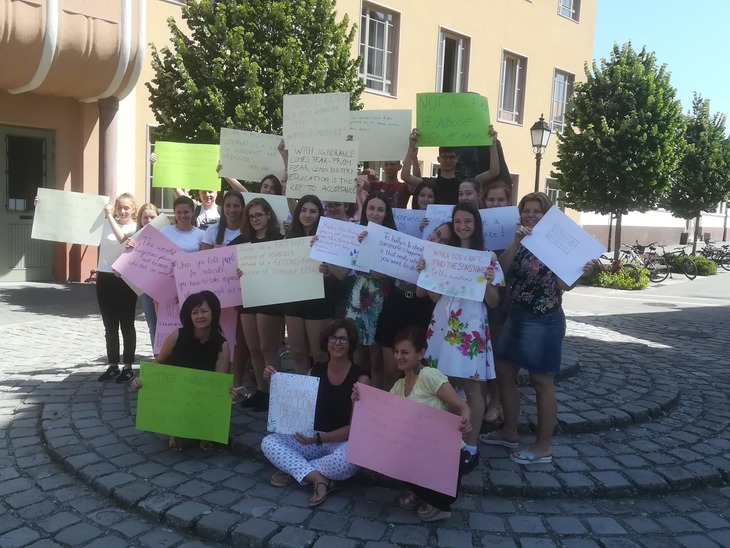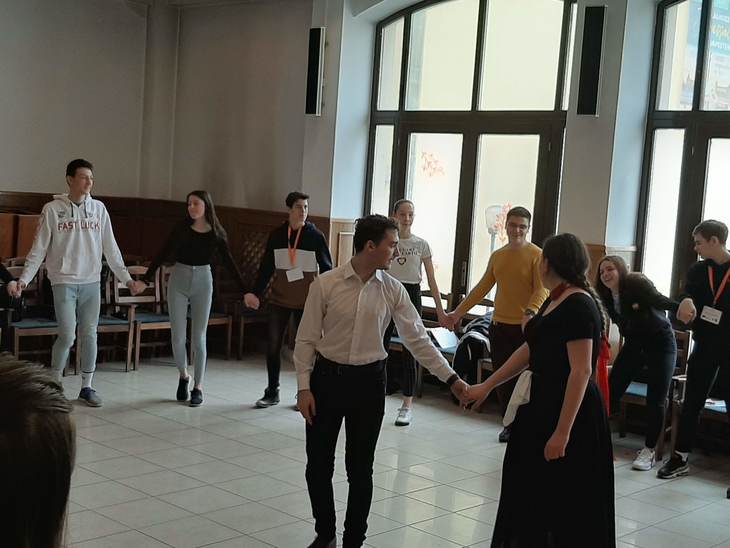
The III. Béla Secondary School, Baja explored the theme of healthy lifestyle in the project that won the Erasmus+ Excellence Award. We talked about the successes achieved, the important milestones and the challenges posed by the corona virus with Noémi Páli, deputy head and project coordinator of the school.
HealTH AT School– The project that makes students dare to ask for help
What was the HealTH AT School project about and what were its main objectives?
The healTH AT School project targeted health from several angles: on the one hand, we focused on physical health, and on the other hand we focused on mental health. This is particularly important now in the 21st century when children live in a virtual world. At the same time, we also included environmental sustainability in our programme, as a good environment is part of healthy life. We tried to approach the topic from all angles, so we implemented a wide range of activities, from dancing to cooking, tests, musical activities, running programmes to get as many students involved as possible in the project.
Who and how many people from the school participated in the project?
Thirty children and six teachers were directly involved in the project. By direct we mean the students who travelled and met students from the partner institutions. In fact, the whole school was involved in the project, so 650 students were mobilized and the entire teaching staff of 56 teachers were involved in the programme. From the very beginning we could involve our school-nurse and school psychologist in the project. Our school psychologist helped us to set up a questionnaire, which enabled us to assess both the input and output state at the beginning and at the end of the project. In addition, as specialists, we involved our biology teachers who supported the students in the healthy lifestyle programme, online meetings were provided by our IT specialists, but all colleagues were there in the background.
Who made up the partnership, what was the collaboration like?
Our partners came from a previous Erasmus+ project, as I had participated in a training course on mobility projects, where I had met the colleagues with whom we started to implement this project a year later. We had partners from Greece, Germany, and Romania with whom we were in regular contact, and I believe that this was one of the particularly great values of the project. For continuous communication, even during the pandemic, we took advantage of the available channels of communication to help the project move forward.
How did the Covid-19 pandemic affect the implementation of the project?
Fortunately, we were able to reach all three partner countries; however, we were only able to visit Romania in 2020 during the pandemic, when we were already facing the challenges.. There was a great need for renewal and for those digital skills that had been developed over the previous two years of the project. This meant that the children worked together a lot virtually in different online spaces, and we used digital tools, because neither the German nor the Greek students were able to travel to the Romanian site.
What do you consider the greatest value of the project, what products were produced?
I would highlight the Health Programme online e-book, which presents the results and takes the reader through the steps: where we started, what our goal was and what we wanted to achieve. With the partners, we also produced a short film on the topic of bullying, that is, bullying at school and its various types. During the production, all partners were in charge of the development of a sub-theme, which resulted in a complete film by the end of the project.
How could they incorporate new knowledge and methodology into the life of the school?
Students are often involved in different awareness-raising programmes, for example, in September, annually, we join a programme focusing on the challenges people with disabilities have to face. In the forefront of this field are the physical education colleagues, organizing classes where children can experience what it is like sitting in a wheelchair to play basketball or to throw a ball blindfolded, so they can be as cooperative and accepting as possible towards their peers.
We also try to help children through art, believing that this method can help them express their concerns, so we also join an international drawing competition organized annually by a school from India. In addition, since the beginning of the project, our Erasmus+ corner has been kept alive, where, for example, we place QR codes, which can be scanned with a smartphone to access awareness-raising videos, short newspaper articles and reports on healthy lifestyle.
What has changed as a result of the project? How have the students changed and improved?
I consider the greatest achievement to be that we have succeeded in raising student’s awareness of the importance of physical and mental health and in getting them to dare to ask for help – and the students realised that the teacher is not an enemy but someone, who is there to help them. As our school psychologist put it, there is a visible huge change: the students are not afraid to approach him, even directly, about what to do in case they feel that they are hurt or bullied.
What kind of feedback has been received from parents?
It is clear from the feedback that parents and students alike expect us to have another Erasmus+ project.The children who leave us say that they would definitely like to go on an Erasmus+ course during their university studies, so we have left an impression on the students that the programme is so valuable and there is so much to learn that it is definitely worth participating.
What was the most exciting journey, a milestone that will remain an eternal memory?
The most interesting project meeting title could be given to the Transylvanian, Romanian gathering, because in it we managed to include everything that our project was about: culture, cooperation, acceptance, and the ability to work together, regardless of being different.
We are all valuable.
|
Values of the project The central topic of the healTHAT School (THATS) project is healthy lifestyle at school, including physical and mental health, with a particular focus on tackling bullying. Student exchanges, digital tools, a jointly produced short film, and awareness-raising programmes enriched the partnership, which has been successful, despite the challenges of the Covid-19 pandemic, thanks to continuous renewal and online contact. From the very beginning of the project, they managed to involve the school-nurse and psychologist. As experts put it, the biggest impact of theproject is that students already dare to ask for help. The Health Program online e-book contains the most important results and guides the reader through the main steps of project implementation. Organization:III. Béla Secondary School, Baja |
Boglárka Simon | Communication Officer
Tempus Public Foundation | Erasmus+ Programme Directorate
Utolsó módosítás: 2022.11.21.












